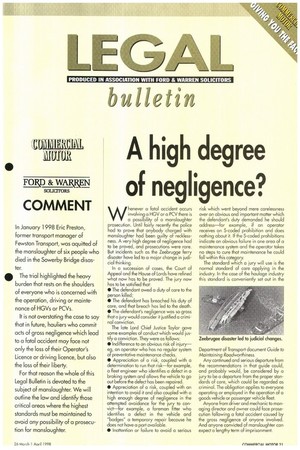COMMENT
Page 23

If you've noticed an error in this article please click here to report it so we can fix it.
In January 1998 Eric Preston, Former transport manager of Fewston Transport, was aquitted of the manslaughter of six people who died in the Sowerby Bridge disaster.
• The trial highlighted the heavy burden that rests on the shoulders of everyone who is concerned with the operation, driving or maintenance of HGVs or PCVs.
It is not overstating the case to say that in future, hauliers who commit acts of gross negligence which lead to a fatal accident may face not only the loss of their Operator's Licence or driving licence, but also the loss of their liberty.
For that reason the whole of this Legal Bulletin is devoted to the subject of manslaughter. We will outline the law and identify those critical areas where the highest standards must be maintained to avoid any possibility of a prosecution for manslaughter.
A high degree of negligence?
Whenever a fatal accident occurs involving a HGV or a PCV there is a possibility of a manslaughter prosecution. Until fairly recently the police had to prove that anybody charged with manslaughter had been guilty of recklessness. Avery high degree of negligence had to be proved, and prosecutions were rare. But incidents such as the Zeebrugge ferry disaster have led to a major change in judicial thinking.
In a succession of cases, the Court of Appeal and the House of Lords have refined what now has to be proved. The jury now has to be satisfied that: • The defendant owed a duty of care to the person killed; • The defendant has breached his duty of care, and that breach has led to the death.
• The defendant's negligence was so gross that o jury would consider it justified a criminal conviction.
The late Lord Chief Justice Taylor gave some examples of conduct which would justify a conviction. They were as follows: • Indifference to an obvious risk of injuryeg, an operator who has no regular system of preventative maintenance checks. • Appreciation of a risk, coupled with a determination to run that risk—for example, a fleet engineer who identifies a defect in a braking system and allows the vehicle to go out before the defect has been repaired.
• Appreciation of a risk, coupled with an intention to avoid it and also coupled with a high enough degree of negligence in the attempted avoidance for the jury to convict—for example, a foreman fitter who identifies a defect in the vehicle and "bodges" a temporary repair because he does not have a part available.
• Inattention or failure to avoid a serious risk which went beyond mere carelessness over an obvious and important matter which the defendant's duty demanded he should address—for example, if an operator receives an S-coded prohibition and does nothing about it. If the 5-coded prohibitions indicate an obvious failure in one area of a maintenance system and the operator takes no steps to cure that maintenance he could fall within this category. The standard which a jury will use is the normal standard of care applying in the industry. In the case of the haulage industry this standard is conveniently set out in the Department of Transport document Guide to Maintaining Roadworthiness.
Any continued and serious departure from the recommendations in that guide could, and probably would, be considered by a jury to be a departure from the proper standards of care, which could be regarded as criminal. The obligation applies to everyone operating or employed in the operation of a goods vehicle or passenger vehicle fleet. Anyone from driver and mechanic to managing director and owner could face prosecution following a fatal accident caused by the gross negligence of anyone involved. And anyone convicted of manslaughter can expect a lengthy term of imprisonment.




































































































